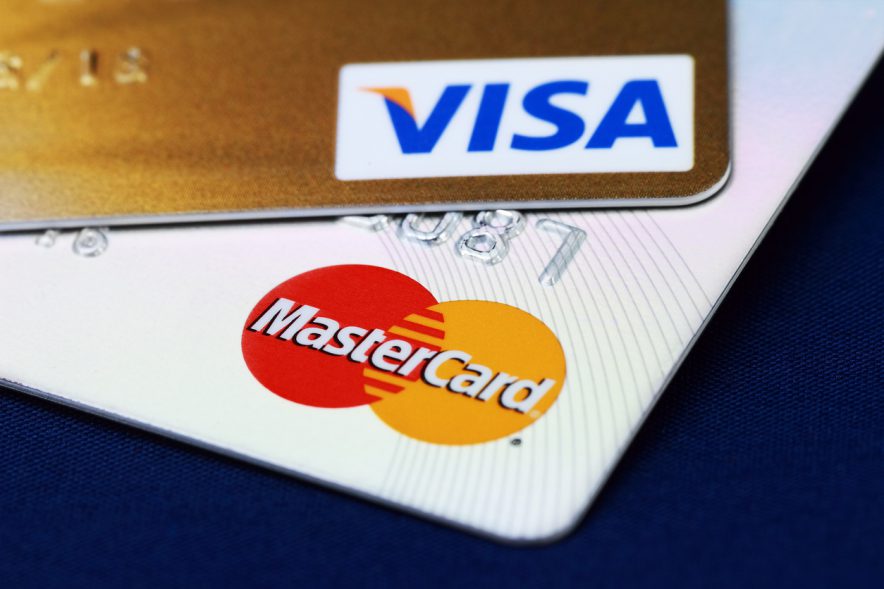
Visa, Mastercard Team Up For Tokenization
Credit card giants Visa and MasterCard are teaming up to make e-payments safer. Over the years, digital wallets have been increasing in popularity, and they offer many benefits: they make payments quicker and easier, and the convenience digital wallets provide fit in with consumer’s busy lifestyles.
However, it has become clear from research that consumers still have concerns over the security of digital wallets and there is still a lack of uniformity in this area. But by working together, Visa and MasterCard can help to address these problems, as well as accelerate the use of tokenization.
According to the statement released by both MasterCard and Visa, the “reciprocal tokenization agreement allows Visa to request tokenized MasterCard payment credentials from MasterCard for provisioning into Visa Checkout, and for MasterCard to request tokenized Visa credentials from Visa for provisioning into Masterpass.”
For those not familiar with tokenization, it improves security by replacing sensitive card data such as card numbers, expiry dates etc. with tokens. If a system was to get hacked, the card details would have been replaced by a string of a random numbers or tokens, which will be of no use to a hacker. However, as will be explained later in this article, that does not mean tokenization provides 100 percent protection for the users of digital wallets.
Although the joint initiative is new, MasterCard has been using tokenization for a while now. The credit card company says the introduction has been popular, and this new joint initiative with Visa, which was announced late last year, is an acceleration of their open digital wallet. It is hoped that it will help to tackle of online fraud, which increased followed the implementation of EMV, and it is one of many steps financial companies are taking to improve security.
Introducing Uniformed Standards & the Expansion of Tokenization
As Business Insider explains, the agreement between the two credit card companies has formed a ‘uniformed standard’, and the partnership should ease consumers’ fears over potential security concerns.
With newer payment formats, such as digital wallets, security concerns are often foremost in consumers’ minds, and with both Internet shopping and digital wallets growing in popularity, it is natural that a minority will look for ways to exploit this, which is why the introduction of a uniformed standard is important and improve security is all the more vital.
Indeed, Visa cites the increase in Internet shopping and the need for secure transactions as one of the reasons it has introduced tokenization in the form of the Visa Token Service. Commenting on the partnership, Visa says the acceleration of tokenization, which has been made possible through its reciprocal open digital wallet partnership with MasterCard, will benefit merchants, issuers and consumers.
For its part, MasterCard says demand for its tokenization service has been “extremely strong”, and by partnering with Visa, the hope is tokenization will become more widely used.
And the experts feel that that the collaboration between the two companies is likely lead to a further acceleration of tokenization.
According to analysis by industry experts, it is widely felt that the agreement will help to fuel the expansion of digital/mobile as wallets as more consumers will become familiar with them, however, there are some obvious barriers that must be overcome first.
Barriers to Digital Payments & Mobile Wallets
The two biggest concerns that have stopped consumers widely embracing digital payments/mobile payments are potential security and fraud issues, but some of these concerns has been addressed through tokenization.
However, other concerns that have been highlighted by research include people’s attitudes towards their usual credit card companies, and the lack of merchants who accept payments by mobile wallets.
In addition, according to statistics from Econsultancy, 33 percent of people don’t see any purpose in changing over from their current payment methods, while 30 percent said they are insufficient pay points.
Further research by NFC World indicates that consumers view the fact that there isn’t a singular payment system as an issue, while others feel that credit card companies give better rewards than payment wallets.
However, this is where agreements like the one between MasterCard and Visa could change things. Consumers tend to stay with their usual payment method because they have become loyal to it.
Nevertheless, as alternative payments become more commonplace, Business Insider points out, that loyalty programs are likely to be more widely integrated into them, making mobile payments more rewarding thus breaking down one of the common barriers to the wider adoption of mobile wallets.
The payments industry also needs to do more to persuade consumers of the benefits of using e-payments and mobile devices. As Tim Spenny, Vice President on GfK’s Financial Services team, states:
“Many consumers today do not understand the value proposition offered by mobile payments.”
“This creates an opportunity for the industry to develop its own narrative around why people should use mobile devices to pay for their purchases – with security, speed, and ease of use top among the reasons.”
Research also shows a clear generational gap when it comes to attitudes towards newer payment methods. Generally, younger users are more relaxed regarding security, they are more likely to use mobile payments in the future in, and over 50% of younger mobile device users have already made a mobile payment.
Growth in Digital Payments
Digital payments grew by 10% globally in 2015, according to figures from the World Payments Report, and there are numerous reasons for this.
One of the reasons behind the growth is the strong adoption by emerging economies. However, financial institutions have also been innovating to meet the demands of customers who want new ways to pay, and this had led to developments of new digital payment methods.
Digital wallets were also expected to experience significant growth throughout 2016, with names like Apple Pay and Android Pay leading the way. It is predicted these two wallets will be attracting annual spends of $8 billion by 2018, and the same Mobile & Online Remote Payments for Physical & Digital Goods: Opportunities& Forecasts 2016-2021 predicts that “more than 85% of remote goods payments are forecast to be made using mobile devices in 2021.”
If these figures are realized – and if smartphones and digital wallets do start to dominate the payment landscape in the way that is predicted – it is vital to find ways to make digital wallets more secure and to find a more uniformed approached to do so, as they are likely to become a stronger target as hackers look for ways to exploit them.
How Tokenization Can Enhance Digital Wallet Security & Safety
While EMV has been rolled out to make cardholder present transactions safer, more needs to be done to combat the rise in card nor present fraud.
Tokenization is used widely in the payments industry and it is something that is increasingly being used to making online and digital purchases safer. However, while tokenization can enhance the security of digital wallets, merchants are warned that there isn’t one single step that is guaranteed to prevent fraud.
However, when it comes to protecting data from hackers, tokenization is regarded as safer as than encryption – and it is often cheaper to implement, too.
Tokenization has also received a lot of interest as a potential means of reducing the risks involved in cloud based and mobile payments.
Cloud based payments are considered by some to be the future of mobile payments. There have been advances in this area in recent years with new start-ups, and Visa has already announced a cloud based payment service.
Another way tokenization helps keep data safe is by helping companies comply with PCI DSS procedures. For companies who handle a lot of credit card data that could potentially be exploited, tokenization has always played vital role in reducing a company’s PCI DSS compliance by storing tokens as opposed to actual credit card data.
Why Security Concerns Matter & Industry Uniformity Is Important
Tokenization has been around for much longer than people might think, and it is now becoming even more crucial.
The increasing amount of data breaches makes tokenization more relevant than before, especially with the predicted growth in digital wallets, which will provide further opportunities as hackers look for loopholes to exploit.
Data breeches occurred frequently throughout 2016, more are predicted for 2017 and beyond, and any size business could become the next victim.
These types of breeches are so damaging to consumer confidence, that 67 percent of consumers say the security of their mobile payments is their second biggest concern when it comes to mobile shopping.
The research from KPMG Loss Barometer also shows 40 percent of digital wallet users say they ‘wouldn’t feel comfortable with a mobile app if it had been subject to a hacking attack, and a data breach could exuberate consumers’ concerns over security.
Further, there’s speculation a major data breach would cripple the growth of mobile wallets, which is why it is important the finance industry acts now to address consumers’ concerns over security, and the lack of cohesiveness across the sector.
And while there are many new innovations in the Fintech world aimed at making digital wallets safer, there had been little in the way of the way of uniformity, and the security of payments remains unbalanced. However, the agreement between Visa and MasterCard should start to change this.
In addition, there is another, bigger issue that deserves discussion and that is the varied approaches that different countries take worldwide when it comes to digital wallet security. For instance, in developing countries like India there are often no prescribed standards for e-wallet laws, despite the fact that the government is pushing towards a cashless society.
This lack of standards puts consumers’ cash at risk and with developing countries being among the fastest adopters of digital wallets action needs to be taken regarding uniformity if consumers money is going to be protected and transactions are going to be made more secure.
In the Payments Industry, Collaboration Is Key to Fighting Fraud
This is not the first time that MasterCard and Visa have teamed up to improve payment security. The payments industry giants announced an initiative in 2014 following several major data breaches, including the one at Target.
The group was part of a cross-industry initiative, which also involved retailers and merchants, and explored all areas of payment security, including EMV and tokenization, as well as efforts to improve online and mobile security.
The parties worked together to accelerate the recent EMV migration throughout the United States, and they also teamed up to promote tokenization to add extra security to online and mobile payments.
At the time, a Visa spokesperson highlighted the need for collaboration to defeat fraud in the payments industry.
As payment trends change and consumers and digital wallets become a broader part of the payments system it is essential that the finance industry works together to create solutions that can lower the risk of fraud and increase security for consumers, as well as make the shopping experience more convenient for the consumer.
Conclusion
The collaboration between MasterCard and Visa addresses the need for a more uniformed standard that aims to make online transactions more secure and as well as accelerate tokenization. In addition, at a time when digital wallets are predicted to climb in popularity, these measures should give both merchants and consumers the added reassurances they seek over potential security issues.
However, away from the security issues, there are barriers that must be overcome if the adoption of digital wallets is to be picked up at a stronger pace. Consumers remain reluctant to turn their back on their usual credit cards, they find traditional credit card use more rewarding and easier to track, and research shows the generational gap between mobile payment users remains.
Nevertheless, although there are still challenges to be overcome before consumers adopt digital wallets in stealth, the collaboration between Visa and MasterCard, which is due to be launched in the latter part of 2017, is a step in the right direction for both improved security and the acceleration of tokenization.
Ready to get started?
Get in touch or create an account





